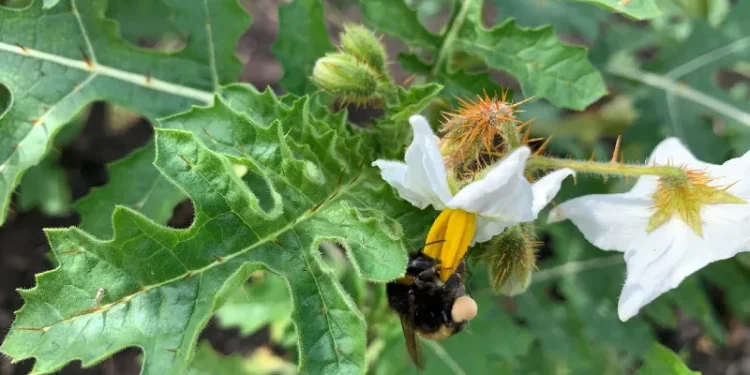Improving the reliability of trap cropping to help farmers overcome potato cyst nematode (PCN) pressure, is being investigated as part of a new feasibility study, funded by Defra and Innovate UK.
The project will look at DeCystTM solanaceous trap crops, which stimulate PCN to hatch at a different point in the rotation to when potatoes are planted. As a result, mature female PCN are prevented from completing their lifecycle, reducing the impact on potato crops.
Work will focus on investigating the performance of three solanaceous trap crops – solanum sysimbriifolium (DeCyst-Prickly) [pictured above], solanum scabrum (DeCyst-Broadleaf) and solanum chenopodioides (DeCyst-Podium), to determine the best species and agronomic guidelines for effective PCN suppression.
Taking part in the project are Produce Solutions, Crop Health and Protection (CHAP), Harper Adams University and VCS Potatoes, supported by five potato growers – TC & N Taylor Ltd, J.M. Bubb & Son, ME Furniss & Sons (Farms), James Foskett Farms Ltd and A.F. Machinery Ltd.
Dr Matthew Back of Harper Adams University, said: “PCN is the most prevalent potato pest in the UK. Infestation can mean yield losses of up to of 80%, and is estimated to cost the GB potato industry a huge £25.9 million each year.
“As crop protection chemistry such as nematicides are revoked, and control measures limited, growers have to investigate alternative methods such as trap crops, to ensure a viable future for potatoes within their rotations.”
Grown optimally, S.sisymbriifolium (DeCyst-Prickly) can reduce PCN populations by more than 75%, but inconsistent establishment has impacted adoption on-farm. It’s hoped that by understanding agronomic best practice such as sowing dates, weed control and general management, trap crops will become more appealing to growers.
James Lee of Produce Solutions, said: “We need all the tools available to us to control PCN, particularly if we lose a further nematicide option, and adoption of solanaceous trap crops could mean an increase in resilience and maintain productivity for the UK potato industry.
“An additional benefit is because they are chopped and incorporated into the soil, they add organic matter and increase carbon storage. This is especially important given the move to more regenerative farming systems and emerging carbon markets.”
Dr Alex McCormack, Innovation Technical Lead at CHAP, said: “It’s been great to support the consortium and help them to navigate the grant call and application, enabling them to build upon their previous AHDB and Innovative Farmers Fieldlab.
“This just demonstrates how these new farmer-focused grants from Defra could help unlock applied on farm R&D for the future.”
For more information about this project, contact CHAP at enquiries@chap-solutions.co.uk or visit www.chap-solutions.co.uk







